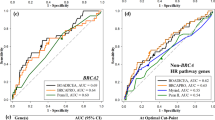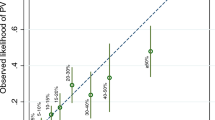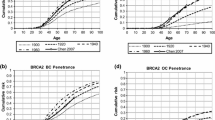Abstract
Genetic risk prediction models such as BRCAPRO are used routinely in genetic counseling for identification of potential BRCA1 and BRCA2 mutation carriers. They require extensive information on the counselee and her family history, and thus are not practical for primary care. To address this gap, we develop and test a two-stage approach to genetic risk assessment by balancing the tradeoff between the amount of information used and accuracy achieved. The first stage is intended for primary care wherein limited information is collected and analyzed using a simplified version of BRCAPRO. If the assessed risk is sufficiently high, more extensive information is collected and the full BRCAPRO is used (stage two: intended for genetic counseling). We consider three first-stage tools: BRCAPROLYTE, BRCAPROLYTE-Plus, and BRCAPROLYTE-Simple. We evaluate the two-stage approach on independent clinical data on probands with family history of breast and ovarian cancers, and BRCA genetic test results. These include population-based data on 1344 probands from Newton-Wellesley Hospital and mostly high-risk family data on 2713 probands from Cancer Genetics Network and MD Anderson Cancer Center. We use discrimination and calibration measures, appropriately modified to evaluate the overall performance of a two-stage approach. We find that the proposed two-stage approach has very limited loss of discrimination and comparable calibration as BRCAPRO. It identifies a similar number of carriers without requiring a full family history evaluation on all probands. We conclude that the two-stage approach allows for practical large-scale genetic risk assessment in primary care.




Similar content being viewed by others
References
Antoniou A, Pharoah PD, Narod S, Risch HA, Eyfjord JE, Hopper JL et al (2003) Average risks of breast and ovarian cancer associated with BRCA1 or BRCA2 mutations detected in case Series unselected for family history: a combined analysis of 22 studies. Am J Hum Genet 72:1117–1130
King MC, Marks JH, Mandell JB (2003) Breast and ovarian cancer risks due to inherited mutations in BRCA1 and BRCA2. Science 302:643–646
Drohan B, Roche CA, Cusack JC (2012) Hughes KS (2012) Hereditary breast and ovarian cancer and other hereditary syndromes: using technology to identify carriers. Ann Surg Oncol 19:1732–1737
Drohan B, Ozanne EM, Hughes KS (2009) Electronic health records and the management of women at high risk of hereditary breast and ovarian cancer. Breast J 15(Suppl 1):46–55
Parmigiani G, Berry D, Aguilar O (1998) Determining carrier probabilities for breast cancer- susceptibility genes BRCA1 and BRCA2. Am J Hum Genet 62:145–158
Chen S, Wang W, Broman KW, Katki HA, Parmigiani G (2004). BayesMendel: an R environment for Mendelian risk prediction. Stat Appl Genet Mol Biol 3(1):1–19; Article 21
CancerGene (2015) https://www4.utsouthwestern.edu/breasthealth/cagene/. Accessed 31 December 2015
BayesMendel Web-based Risk Service (2015) http://bayesmendel.dfci.harvard.edu/risk/. Accessed 31 December 2015
HughesRiskApps (2015) http://www.HughesRiskApps.com. Accessed 31 December 2015
Tai YC, Chen S, Parmigiani G, Klein AP (2008) Incorporating tumor immunohistochemical markers in BRCA1 and BRCA2 carrier prediction. Breast Cancer Res 10:401
Katki HA, Blackford A, Chen S, Parmigiani G (2008) Multiple diseases in carrier probability estimation: accounting for surviving all cancers other than breast and ovary in BRCAPRO. Stat Med 27:4532–4548
Katki HA (2007) Incorporating medical interventions into Mendelian mutation prediction models. BMC Med Genet 8:13
Chen S, Blackford A, Parmigiani G (2009) Tailoring BRCAPRO to Asian-Americans. J Clin Oncol 27:642–643
Biswas S, Tankhiwale N, Blackford A, Barrera AM, Ready K, Lu K et al (2012) Assessing the added value of breast tumor markers in genetic risk prediction model BRCAPRO. Breast Cancer Res Treat 133:347–355
Mazzola E, Blackford A, Parmigiani G, Biswas S (2015) Recent Enhancements to the genetic risk prediction model BRCAPRO. Cancer Inform 14(S2):147–157
Biswas S, Atienza P, Chipman J, Hughes K, Gutierrez Barrera AM, Amos CI et al (2013) Simplifying clinical use of the genetic risk prediction model BRCAPRO. Breast Cancer Res Treat 139:571–579
Ozanne EM, Loberg A, Hughes S, Lawrence C, Drohan B, Semine A et al (2009) Identification and management of women at high risk for hereditary breast/ovarian cancer syndrome. Breast J 15:155–162
Parmigiani G, Chen S, Iversen ES, Friebel TM, Finkelstein DM, Anton-Culver H et al (2007) Validity of models for predicting BRCA1 and BRCA2 mutations. Ann Intern Med 147:441–450
NCCN guidelines (2015) http://www.nccn.org/professionals/physician_gls/f_guidelines.asp#detection. Accessed 31 December 2015
Gilpin CA, Carson N, Hunter AG (2000) A preliminary validation of a family history assessment form to select women at risk for breast or ovarian cancer for referral to a genetics center. Clin Genet 58:299–308
American Society of Clinical Oncology (1996) Statement of the American Society of Clinical Oncology: genetic testing for cancer susceptibility. J Clin Oncol 14:1730–1736
Chen S, Wang W, Lee S, Nafa K, Lee J, Romans K et al (2006) Prediction of germline mutations and cancer risk in the Lynch syndrome. J Am Med Assoc 296:1479–1487
Wang W, Chen S, Brune KA, Hruban RH, Parmigiani G, Klein AP (2007) PancPRO: risk assessment for individuals with a family history of pancreatic cancer. J Clin Oncol 25:1417–1422
Wang W, Niendorf KB, Patel D, Blackford A, Marroni F, Sober AJ et al (2010) Estimating CDKN2A carrier probability and personalizing cancer risk assessments in hereditary melanoma using MelaPRO. Cancer Res 70:552–559
Acknowledgments
This work was supported in part by the following Grants: 1R03CA173834-02 and 2P30CA006516-47 from the National Cancer Institute.
Author information
Authors and Affiliations
Corresponding author
Ethics declarations
Conflict of interest
Kevin Hughes is a founder of and has a financial interest in Hughes Risk Apps (HRA), LLC. Dr. Hughes’s interests were reviewed and are managed by Massachusetts General Hospital and Partners HealthCare in accordance with their conflict of interest policies. Kevin Hughes has received honoraria from Myriad Genetics Speaker’s Bureau and holds stock options in 5 AM solutions. GP is on the SAB of HRA and holds stock options in the company.
Electronic supplementary material
Below is the link to the electronic supplementary material.
Rights and permissions
About this article
Cite this article
Biswas, S., Atienza, P., Chipman, J. et al. A two-stage approach to genetic risk assessment in primary care. Breast Cancer Res Treat 155, 375–383 (2016). https://doi.org/10.1007/s10549-016-3686-2
Received:
Accepted:
Published:
Issue Date:
DOI: https://doi.org/10.1007/s10549-016-3686-2




